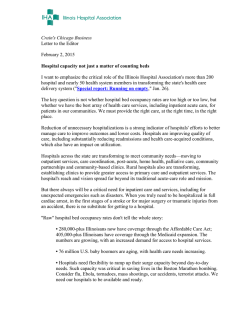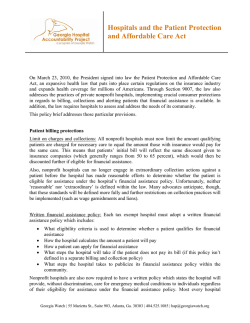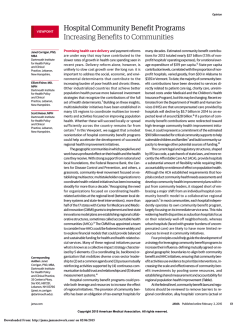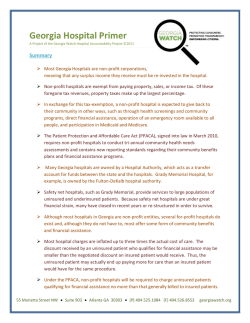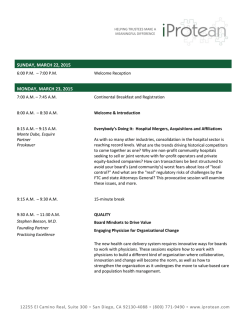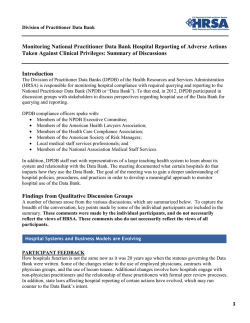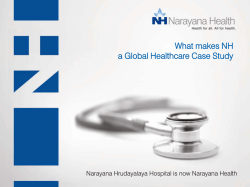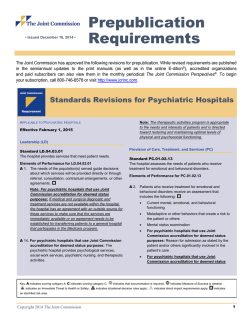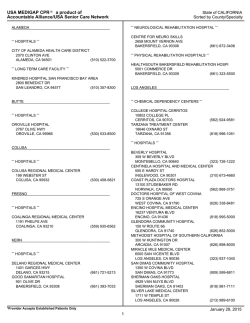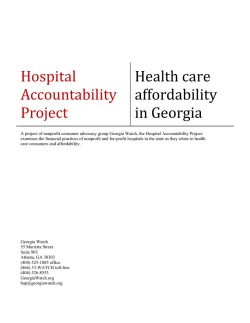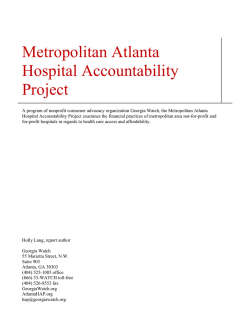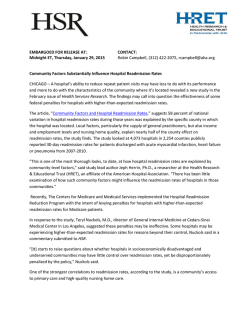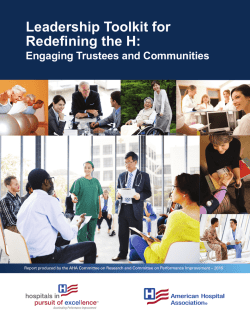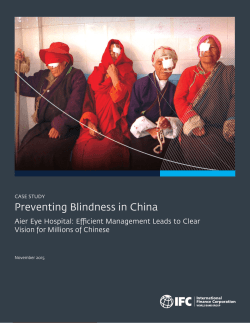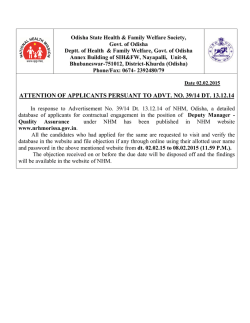
Healthcare Affordability Primer
Healthcare Affordability Primer A Project of the Georgia Watch Hospital Accountability Project ©2011 General tips for affording healthcare Always ask for a detailed bill that has each charge itemized so you are able to double check for errors. Common errors include charges for medications that were not administered and charges for a private room when you had a shared room. Know your rights as a health care consumer. Hospitals and other health care providers are obligated to give you clear and transparent financial information about your bill and any health care procedures. Ask questions. It’s your right to ask your doctor why he is ordering a certain medical test and for your doctor to explain why it is medically appropriate. If you do not have insurance, this right is especially important in order to avoid unnecessary tests that will increase your bill. If you are uninsured or have high deductibles, inquire about charges before seeing your doctor or a specialist, because: You may be able to reduce service fees by negotiating rates. Insured are charged less compared to those who are uninsured because their insurance companies have negotiated discounted rates with medical providers. Ask about a payment plan. Most hospitals will allow a patient to make monthly payments on their bill. If you are insured, read each page of your insurance policy carefully. If you don’t understand a portion of your policy, call the insurer’s help line for clarification. Understanding what coverage you have could help you avoid costly bills. Know your consumer rights and financial options by asking hospitals about public health coverage in your state. In Georgia, there are medical assistance programs that provide services to those in need. If you are insured, make sure you receive a notice called, “Explanation of Benefits,” from your insurance company. This notice will list services that were not covered by your insurance company, and it should give you more information on your appeal rights. If you are uninsured, ask about subsidized care. Most hospitals receive state funding to cover health care for low-income people. For example, the Indigent Care Trust Fund (ICTF) is a Georgia-sponsored program that pays hospitals to provide inpatient and outpatient health care for low-income people. Hospitals are required to notify eligible patients about this service and treat them for free or on a sliding scale. Anyone who needs financial assistance with their 55 Marietta Street NW Suite 903 Atlanta GA 30303 [P] 404.525.1084 [F] 404.526.8553 georgiawatch.org hospital bill can apply for help through the hospital’s billing office. Generally, only people who live below or just above the federal poverty level are eligible to receive assistance, although most hospitals will offer some sort of discount to a patient who does not live at the poverty level but still needs help. And even though your hospital may automatically screen you for Medicaid eligibility, be sure to ask anyway; you may be eligible for financial assistance through that program. For those who do not have prescription medication coverage, there are assistance programs that offer either discounted or free prescription medications. Prescription card services offer eligible uninsured and low-income households savings on prescription medicines from drug companies. Visit GeorgiaDrugCard.com or check with the manufacturer of your medications. Walk-in clinics are another cost-effective option for families without a regular primary-care physician. A patient can be treated and diagnosed in less time compared to an emergency room. For the uninsured, local clinics can be an alternative to free or low-cost health care. Clinics and urgent care centers are less costly and time consuming than an emergency room visit during non-emergent care. The average emergency room visit costs $1,500, as compared to the average clinic visit of $29. Financial assistance through the Georgia Indigent Care Trust Fund Most tax-exempt hospitals in Georgia receive funds from the ICTF, a 20-year-old program that expands Medicaid eligibility and services, supports rural health care facilities that serve the medically indigent, and funds primary healthcare programs for medically indigent Georgians. Georgia’s Disproportionate Share Hospital (DSH) program is funded through the ICTF, which provides funding to hospitals and other health care providers to help offset financial losses on uninsured, underinsured, and low-income individuals, as defined by the state plan in accordance with federal regulations. DSH payments are additional payments in Medicaid and Medicare programs that help finance care to low-income and uninsured patients. These payments also help ensure that certain highcost services – such as burn units and trauma care – are available to everyone. Because these services cost more than others, hospitals that serve many of these patients would likely encounter greater costs for their Medicaid and Medicare patients than would other facilities. These hospitals often have higher uncompensated care costs and fewer patients with private insurance than other hospitals. Approximately 145 private and public hospitals participated in Georgia’s DSH program, including both rural and urban facilities. In order to receive subsidies through the ICTF, participating hospitals must: Keep a log of eligible patient accounts, with relevant patient financial information, including billing information; 55 Marietta Street NW Suite 903 Atlanta GA 30303 [P] 404.525.1084 [F] 404.526.8553 georgiawatch.org Ensure that preadmission deposits are not required on demand as a condition of treatment of Medicaid eligible persons or medically indigent persons; and, Maintain clear signage in points of entry to the hospital that financial assistance is available for those who qualify, and are given written information explaining the terms of eligibility and the application process for those services. By complying with these regulations, hospitals are better able to serve their financially vulnerable patients. Common eligibility requirements for financial assistance Financial assistance eligibility requirements vary from hospital to hospital, although all, to some degree, utilize income figures to determine if a patient qualifies for assistance. The ICTF establishes minimum standards that require the hospital to provide free services to persons with incomes below 125 percent of the federal poverty level and to provide free services or adopt a sliding fee scale for persons with incomes between 125 and, at a minimum, 200 percent of the federal poverty level. The ICTF manual also sets out standards for determining patient eligibility: Income should be considered the family’s gross income, either determined by the average monthly income for the previous three months or for the previous year, whichever is more favorable to the applicant; For those who are self-employed, income counted is gross income minus work expenses directly related to producing the goods or services, and without which the goods or services could not be produced; Temporary Assistance for Needy Families (TANF) or Social Security Insurance income should not be counted; and Income from any person who is not financially responsible for the patient should not be included, such as child support payments. In addition, some hospitals offer financial assistance only to residents of the county in which the hospital is located, such as Southern Regional Medical Center, which offers financial assistance only to residents of Clayton County. Under ICTF guidelines, hospitals are required to make public their formal financial assistance policies. During site visits conducted at 34 surveyed hospitals in April 2010, almost every hospital representative stated that a patient’s eligibility would be determined on a case-by-case basis and that standard guidelines were not available. However, the federal Patient Protection and Affordable Care Act (PPACA) now requires that hospitals adopt standard guidelines for financial assistance. 55 Marietta Street NW Suite 903 Atlanta GA 30303 [P] 404.525.1084 [F] 404.526.8553 georgiawatch.org Hospitals participating in the ICTF are required to provide a copy of their financial assistance policy to anyone who asks, and the failure to do so is not just a violation of regulation but also a barrier to affordable care for many patients. While counseling about available financial assistance is given at most hospitals upon discharge, hospitals should communicate their policies in a written, clear, and transparent manner to anyone who requests them. General standards for most financial assistance programs Many hospitals use similar financial standards for determining whether a health care consumer is eligible for financial assistance with their hospital bill. Generally, patients who are considered “indigent” will have most – if not all – of their medical bill written off, as they will likely be unable to pay. Patients who are not eligible but still cannot afford their bill due to income restraints are often eligible for reduced cost care, which is termed “charity care.” For purposes of qualifying for hospital financial assistance (and not necessarily for Medicaid): You are considered medically indigent if your income is at the poverty level or below. For a family of one, this is $11,170. For a family of two, this amount is $15,130. You can find additional amounts here. You are eligible for charity care if you make twice the Federal Poverty Level or below. Some financial resources – such as child support or disability payments – can also be counted in the income requirements. Notice of available financial aid information In addition to the display of information in various areas, the hospital must provide forms and instructions to those who may be eligible for reduced or free care. Specifically, ICTF regulations require that hospitals must: Provide notice of available financial assistance, including the following: o The availability of free and reduced-charge services; o The patient’s ability to gain admittance without pre-admission deposits; o The right not to be transferred solely or in significant part for economic reasons; o The availability of services provided; o The terms of eligibility for free and reduced-charge services; o The application process for these services; and o The person or office to which complaints or questions about the hospital’s participation in these services should be directed. Provide similar individual notices to each patient potentially eligible for free or reducedcharge services. These notices should also be included with a patient’s bill, and should include the Department of Community Health’s toll-free number for individuals to call if 55 Marietta Street NW Suite 903 Atlanta GA 30303 [P] 404.525.1084 [F] 404.526.8553 georgiawatch.org they are unable to resolve any problems experience with ICTF assistance at their hospital (1-877-261-3117). Place easily readable signs in the emergency room, business office, and admissions area that include the appropriate program information. Provide notices in English, Spanish, and any other appropriate languages. Instruct staff to communicate the content of the notices to people who are unable to read and to assist individuals who have difficulty applying for available services. The PPACA also requires that hospitals post information about their financial assistance plans on their websites. Unfortunately, Georgia hospitals are not always consistent in their compliance with these notification requirements. Even if you don’t see any signs or notices, be sure to ask; most likely, financial assistance is available. Further information More information on the Georgia Indigent Care Trust Fund can be found at the Georgia Department of Community Health’s website or by calling 1-877-261-3117. Visit GaMap2Care.org to find information on hospitals in your area. To learn more about the Patient Protection and Affordable Care Act, visit HealthCare.gov. 55 Marietta Street NW Suite 903 Atlanta GA 30303 [P] 404.525.1084 [F] 404.526.8553 georgiawatch.org
© Copyright 2026
